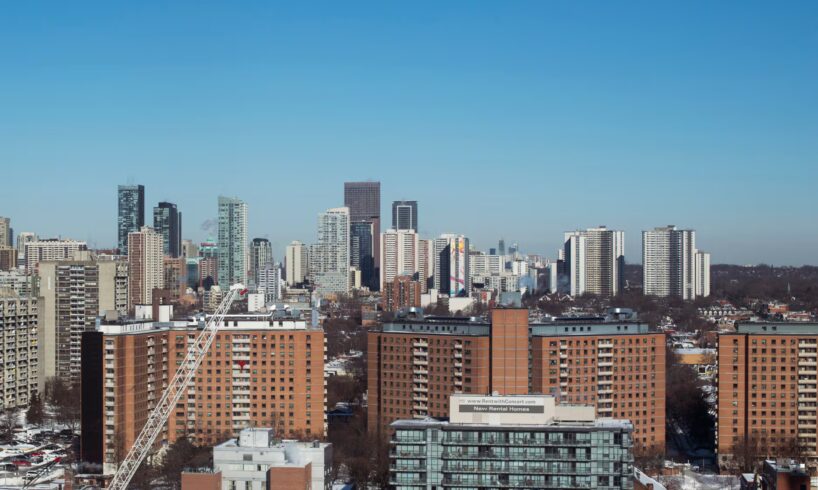
Open this photo in gallery:
A row of condos and apartment buildings in Toronto in 2019.Fred Lum
It only took four days for the Ontario government to walk back major portions of its plan to allow faster evictions of tenants, but critics say the proposals still undermine tenant rights and should be scrapped.
On Oct. 23, Minister of Municipal Affairs and Housing Rob Flack introduced Bill 60, titled the Fighting Delays, Building Faster Act, with a raft of proposals aimed at making evictions faster in the province. It included a plan to consult on “alternate options for lease agreement expiry.” The announcement was met with vociferous pushback from tenant groups and housing advocates, many of whom still denounce a bill they say will give landlords a faster path to evict tenants who fall behind on rent.
“There’s nothing here for tenants, not even a pretext that we’ve seen in other bills,” said Dania Majid, a staff lawyer for the Advocacy Centre for Tenants Ontario and director of its tenant duty counsel program that provides free legal advice to renters. Ms. Majid zeroed in on proposals that will allow landlords to file for eviction seven days after a missed rent payment, cutting in half the previous 14-day notice period. “We know workers who are renters and don’t have more than one month’s savings, where one missed paycheque resulted in arrears. This is how Doug Ford is standing up for workers: he’s going to get them evicted. They will have less than a week to try to come up with that money to save a tenancy,” she said.
Open this photo in gallery:
Ontario Municipal Affairs and Housing Minister Rob Flack introduced proposed changes to provincial tenancy laws in October.Cole Burston/The Canadian Press
Tenant groups are hoping the government will consider walking away from other eviction provisions.
“The legislation still significantly undermines renters’ rights and exacerbates the housing and homelessness crisis across the province,” said Mathieu Dagonas, executive director of the Canadian Centre for Housing Rights.
The government appeared to be looking at ending so-called “evergreen leases.” These 50-year-old provisions in Ontario tenancy law stated that, after a fixed-term lease agreement reaches its end, it automatically converts to a periodic lease (or month-to-month). Attorney-General Doug Downey publicly commented that: “We’ve heard from stakeholders that these evergreen leases that just go on with no end in sight may not be appropriate.”
On Oct. 26, the government responded to the controversy that erupted over that comment, with the Housing Minister calling the notion a non-starter: “Residents expect stability and predictability in Ontario’s rental market, and now is not the time to consider changes to this system,” Mr. Flack said.
Opinion: What a 50-year-old neighbourhood development can teach us about solving Canada’s housing crisis
The language Mr. Downey used closely mirrors that of landlord pressure groups such as Small Ownership Landlords Ontario (SOLO), who applauded other elements of the bill.
“Basically, this is the fruits of our lobbying for the last five years,” said Boubah Bah, a board member of SOLO and past president of the organization. “To us, it doesn’t make any sense to have a never-ending lease.” He pointed to other jurisdictions, such as Nova Scotia and New Brunswick, that have fixed-term lease rules that end tenancies when the contracts end. Mr. Boubah noted that it wasn’t his group’s biggest concern, however: “We want the system to be streamlined to attack the non-payment of rent.”
Open this photo in gallery:
Ontario Premier Doug Ford, left, and Attorney-General Doug Downey attend an availability in Mississauga in April. Mr. Downey has publicly raised the prospect of ending evergreen leases.Chris Young/The Canadian Press
Bill 60 does zero in on that issue with proposals to remove a tenant’s right to raise issues about a landlord’s conduct at hearings on non-payment of rent until they repay 50 per cent of what the landlord says they owe, and also give advance notice to the board they intend to raise counterclaims. The bill also proposes to restrict the kinds of rulings that can be reviewed, and seeks to create a new definition of “persistent late payment” that would be used to instruct adjudicators on eviction matters.
The provincial New Democratic Party shadow Housing Minister Catherine McKenney attacked the bill’s provisions aimed at tackling delays at the Landlord Tenant Board – the country’s largest dispute resolution body for renters and rental providers. She said those delays are almost entirely the legacy of the Ford government’s policies since it came to power in 2018.
“Every failure of this government, whether it’s what’s happened at the LTB, where they inherited a functioning landlord tenant board, they are blaming tenants,” Ms. McKenney said.
Doug Ford considering price caps on event tickets, calls out Ticketmaster for ‘gouging’ Jays fans
Excessive delays in getting hearings and rulings at the LTB rose to crisis levels after 2018. In the three years prior, LTB had dealt with about 80,000 applications a year where a landlord or tenant was seeking an order to resolve a dispute, of which typically 77,000 were resolved by hearing, withdrawal, or mediation.
A 2023 report by Ontario’s Ombudsman found the Ford government had been slow to appoint new LTB adjudicators to replace those who reached the end of their terms. By November, 2019, the Board had just 33 full-time and seven part-time members, well below its traditional complement of 40 full-time and 10 part-time members.
Almost immediately, the case backlog began to grow: In 2015 the LTB had a backlog of open cases that carried over from the previous year of just under 12,000. By 2019, the backlog grew to just under 15,000 cases, and by 2020 it reached 22,803 cases.
In 2020, the COVID-19 pandemic resulted in the work of the LTB being suspended almost entirely between March and August, when virtually all of its hearings were moved from in-person to an online platform. The Ombudsman’s report suggests these changes merely added fuel to a fire that was already burning. By 2021, there were 34,000 cases backed up. There was a slight improvement in 2022, when the backlog dropped to 32,800 cases, but by 2023 the floodgates had opened and the backlog reached 53,000 cases. That level did not begin to shrink until late in 2024. After allocating millions of dollars to expand the number of adjudicators, Tribunals Ontario said the LTB’s backlog as of Sept. 23, 2025 stands at 36,689, more than three times higher than the backlog the Ford government inherited 7 years ago.
The failures of the LTB are one topic tenants and landlords can agree on, even if they don’t agree on the methods to fix it.
“I still am of the opinion Ontario does take far longer for any other jurisdiction in Canada,” for landlord-tenant matters to be resolve, said Tony Irwin, president of The Federation of Rental-Housing Providers of Ontario, which represents some of the largest corporate landlords in the province. “It’s still not operating in a manner most would consider to be reasonable.”





